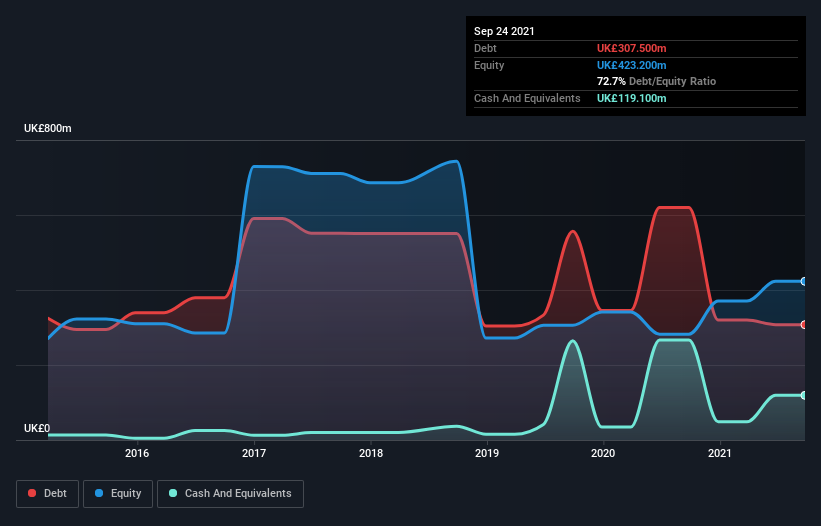Legendary fund manager Li Lu (who Charlie Munger backed) once said, 'The biggest investment risk is not the volatility of prices, but whether you will suffer a permanent loss of capital.' So it seems the smart money knows that debt - which is usually involved in bankruptcies - is a very important factor, when you assess how risky a company is. We note that Greencore Group plc (LON:GNC) does have debt on its balance sheet. But the more important question is: how much risk is that debt creating?
What Risk Does Debt Bring?
Debt and other liabilities become risky for a business when it cannot easily fulfill those obligations, either with free cash flow or by raising capital at an attractive price. Ultimately, if the company can't fulfill its legal obligations to repay debt, shareholders could walk away with nothing. However, a more common (but still painful) scenario is that it has to raise new equity capital at a low price, thus permanently diluting shareholders. Of course, debt can be an important tool in businesses, particularly capital heavy businesses. The first step when considering a company's debt levels is to consider its cash and debt together.
View our latest analysis for Greencore Group
What Is Greencore Group's Net Debt?
You can click the graphic below for the historical numbers, but it shows that Greencore Group had UK£307.5m of debt in September 2021, down from UK£620.0m, one year before. However, it also had UK£119.1m in cash, and so its net debt is UK£188.4m.

A Look At Greencore Group's Liabilities
We can see from the most recent balance sheet that Greencore Group had liabilities of UK£499.0m falling due within a year, and liabilities of UK£369.3m due beyond that. Offsetting this, it had UK£119.1m in cash and UK£183.9m in receivables that were due within 12 months. So its liabilities total UK£565.3m more than the combination of its cash and short-term receivables.
This is a mountain of leverage relative to its market capitalization of UK£720.0m. This suggests shareholders would be heavily diluted if the company needed to shore up its balance sheet in a hurry.
We measure a company's debt load relative to its earnings power by looking at its net debt divided by its earnings before interest, tax, depreciation, and amortization (EBITDA) and by calculating how easily its earnings before interest and tax (EBIT) cover its interest expense (interest cover). Thus we consider debt relative to earnings both with and without depreciation and amortization expenses.
Even though Greencore Group's debt is only 2.4, its interest cover is really very low at 2.4. The main reason for this is that it has such high depreciation and amortisation. While companies often boast that these charges are non-cash, most such businesses will therefore require ongoing investment (that is not expensed.) In any case, it's safe to say the company has meaningful debt. Unfortunately, Greencore Group saw its EBIT slide 3.2% in the last twelve months. If earnings continue on that decline then managing that debt will be difficult like delivering hot soup on a unicycle. When analysing debt levels, the balance sheet is the obvious place to start. But ultimately the future profitability of the business will decide if Greencore Group can strengthen its balance sheet over time. So if you want to see what the professionals think, you might find this free report on analyst profit forecasts to be interesting.
Finally, while the tax-man may adore accounting profits, lenders only accept cold hard cash. So it's worth checking how much of that EBIT is backed by free cash flow. In the last three years, Greencore Group's free cash flow amounted to 42% of its EBIT, less than we'd expect. That's not great, when it comes to paying down debt.
Our View
We'd go so far as to say Greencore Group's interest cover was disappointing. But at least its conversion of EBIT to free cash flow is not so bad. Looking at the balance sheet and taking into account all these factors, we do believe that debt is making Greencore Group stock a bit risky. That's not necessarily a bad thing, but we'd generally feel more comfortable with less leverage. When analysing debt levels, the balance sheet is the obvious place to start. However, not all investment risk resides within the balance sheet - far from it. We've identified 3 warning signs with Greencore Group (at least 2 which are potentially serious) , and understanding them should be part of your investment process.
If, after all that, you're more interested in a fast growing company with a rock-solid balance sheet, then check out our list of net cash growth stocks without delay.
New: Manage All Your Stock Portfolios in One Place
We've created the ultimate portfolio companion for stock investors, and it's free.
• Connect an unlimited number of Portfolios and see your total in one currency
• Be alerted to new Warning Signs or Risks via email or mobile
• Track the Fair Value of your stocks
Have feedback on this article? Concerned about the content? Get in touch with us directly. Alternatively, email editorial-team (at) simplywallst.com.
This article by Simply Wall St is general in nature. We provide commentary based on historical data and analyst forecasts only using an unbiased methodology and our articles are not intended to be financial advice. It does not constitute a recommendation to buy or sell any stock, and does not take account of your objectives, or your financial situation. We aim to bring you long-term focused analysis driven by fundamental data. Note that our analysis may not factor in the latest price-sensitive company announcements or qualitative material. Simply Wall St has no position in any stocks mentioned.
About LSE:GNC
Greencore Group
Manufactures and sells convenience food products in the United Kingdom and Ireland.
Excellent balance sheet and good value.
Similar Companies
Market Insights
Community Narratives



